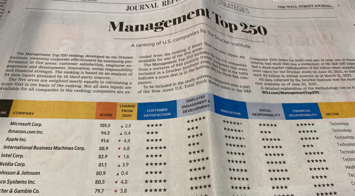
It’s no surprise that the latest “authoritative” ranking of management acumen at U.S. companies relegates those headquartered in Flyover Country mostly to the bottom of the list. But this list sure is frustrating – and wrong-headed. And its bias matters.
The Wall Street Journal just published its annual “Management Top 250” ranking, developed by the Drucker Institute, which purported to measure “corporate effectiveness” by examining performance in five areas: customer satisfaction, employee engagement and development, innovation, social responsibility, and financial strength.
In a display of tremendously disappointing predictability, the index found that fully nine of the top 10 best-managed American companies are headquartered in Silicon Valley, Seattle or on the East Coast, with only Cincinnati-based Procter & Gamble, ranked at No. 9, upsetting the coastal hegemony.
Even worse, Flyover Country companies didn’t fare much better in their fractional representation among the top 25. General Motors was ranked No. 16; 3M, No. 18; and Abbott Laboratories, No. 23. Ford Motor almost qualified, at No. 26.
Unlikely Conclusion
What is this telling us? That only four companies headquartered in the heartland have management teams good enough to rank them among the best 25 in the entire country? Does that seem … real? Is it telling us that the only clusters of the nation’s best-run companies really are in a handful of places including the San Francisco Bay Area, suburban D.C., and New York City?
Or are the poor results for heartland companies in these rankings telling us more about the rankers than about the ranked?
OK, the Journal is headquartered in Manhattan and run by Fox, and with a personal history with the newspaper, I understand why they would be comfortable with a coastal lens. But then combine the newspaper’s East Coast perspective with the West Coast view of the Drucker Institute. Founded by famed management guru Peter Drucker, it nonetheless is situated in suburban Los Angeles, where it may not occur to staffers that the potential geographic bias inherent in their rankings deserves a closer look.
The Journal shared relatively little about the 34 metrics the Drucker Institute used to determine the rankings, so it’s difficult to ascertain how the staff and computers made their decisions. But there were some curious clues.
For example, Microsoft, ranked No. 1, got kudos for the biggest increase of any company in its “innovation” score since Drucker researchers began their ranking in 2017. Why? The Journal cited the fact that CEO Satya Nadella “has pushed the company to develop its cloud-computing business since taking over in 2014.” That’s … innovation? Following Amazon to the cloud?
This is Innovation
While GM and Ford at least made the top 26, how about ranking them up with the digital-tech giants for truly stunning strategic innovation in embracing electric vehicles when the industry hadn’t already made it obvious that was the thing to do? Sure, Drucker gave each automaker five stars for innovation – but why not the five-stars-plus that it gave Microsoft, Amazon, Apple and IBM?
Clearly, “financial strength” can be measured in many ways, lending at least some objectivity to evaluation of that one of the five criteria. But interestingly, in the newspaper’s listing of how many stars each company gets in each area of evaluation, the category is called “financial responsibility.” When you use the term “responsibility,” that opens things up to all sorts of subjective interpretations of what’s “responsible” behavior and what’s not.
For example, under the sway of the today’s woke corporatists, the Business Roundtable has been changing what it regards as responsible corporate behavior to favor more “constituencies” than the shareholders who used to comprise the most important audience for company decisions -- but who now keep getting pushed down in importance. Is that what’s meant by “financial responsibility” and why the more politically progressive managers of coastal companies are rewarded in this category?
There’s also a troubling kind of halo around Silicon Valley denizens even after a year in which they’ve experienced unprecedented friction with the members of an American society with whom they’ve become so greatly intertwined. Vast issues around privacy, political affiliation and censorship, and antitrust concerns haven’t seemed to knock down many of these companies significantly in Drucker’s measure.
Read the rest of this piece at Flyover Coalition.
Dale Buss is founder and executive director of The Flyover Coalition, a not-for-profit organization aimed at helping revitalize and promote the economy, companies and people of the region between the Appalachians and Rockies, the Gulf Coast and the Great Lakes. He is a long-time author, journalist, and magazine and newspaper editor, and contributor to Chief Executive, Forbes, the Wall Street Journal, the New York Times and many other publications. Buss is a Wisconsin native who lives in Michigan and has also lived in Texas, Pennsylvania and Florida.
Photo: courtesy Flyover Coalition












